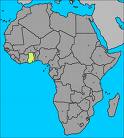The past two days my research team and I have been familiarizing ourselves at the Komfo Anoke Teaching Hospital here in Kumasi where we will be conducting our research the next ten weeks. The maternity wards where we will be spending our time are grossly different from those in the States or other developed countries. Our hospital delivers 40-50 babies each day, and the antenatal (before they give birth) and postnatal (after they give birth) wards are overflowing to the point that they often have two women per bed - the overflow rest on sheet-less mats on the floor. There is absolutely no privacy for these women, as people such as ourselves walk through the aisle and the hustle and bustle of the nurses and medical teams ebbs and flows some how despite the ever-diminishing floor space. This is how it is, unless you have the privilege of affording the "VIP" labor ward that offers curtains, actually clean sheets, and a private delivery room.
In the delivery room, up to 10 women in their first stage of labor (before their cervix has dilated enough to begin delivery) wait in a tiny room with a bench, using buckets to relieve themselves as they wait to reach full dilation, at which point they will be transferred to one of eight side-by-side delivery beds where they will give birth without the assistance of any medication or drugs. As is cultural custom, they are urged by the nurses to refrain from making noise or screaming during delivery.
This is one of the top two hospitals in Ghana. Yet it remains understaffed, understocked with essential life-saving medical supplies, overburdened, and overcrowded. These are just a few of the reasons why my research task is so difficult and important: trying to locate all of the necessary information about each woman who comes in to deliver, and conduct interviews with those who have severe or life-threatening complications during delivery, is an exercise in detective work when patient records regularly go missing, women are transferred without notice to different wards, and the nurses are too overburdened to fully record all of the important information for each patient.
For instance, each of the three delivery wards (the regular, overcrowded one, the VIP one, and the surgical one) have an A&D book- Admission and Dispatch - that tracks each woman while she is there. They each have a delivery book as well that records information about the actual birth. There are also the individual patient records. And finally, the anesthesiologist in the surgery ward has his or her own book. Now, imagine a woman who is admitted to the regular ward and is having labor contractions. She is registered in the A&D book for that ward. One day later, it becomes apparent that she has pregnancy-induced diabetes and needs special care. So she is transferred to the "black room" - the ward for pregnant women with complications. So she is signed out of the first book and into the new ward's book. Then her family manages to come up with some quick cash to get her into the VIP ward for the best care. Now she has been signed out of the second ward, and has been admitted to the new VIP ward and is in it's book. But then the doctors detect fetal distress and decide they need to perform an emergency c-section right away. So she goes down to the surgical ward (called the theater) and is recorded in that book, and has the emergency c-section and is recorded in the anesthesiologist's book, before being returned to the VIP ward with her new baby. So now, she has been admitted into three wards, discharged from two, and her delivery was officially recorded in the third (surgical ward). She is additionally in the anesthesiologists book, and has her own personal chart.
So the next day, when I come in and see there was a woman who had a complication and I go to try to find her, I must track her through each ward and book to find all of the information. This is especially complicated because not all of the proper information was recorded in each of the books. Rather, each of the books captures some of her information, and it is possible that even when combined they fail to capture the full picture of what happened, so I need to find her chart, only it has gone missing....and once I find all of that information, I still need to interview her. Now you begin to get the picture of what we are up against.....
There are many additional logistics to be covered before we can begin our research - most importantly the fact that we are still awaiting the final approval of the IRB ( the Institutional Review Board that must clear us for our research). It also includes securing interpreters for the interviews and finding an appropriate place that ensures privacy during the interview, practicing the interviews and the data entry, and meeting all of the appropriate contacts, nurses and doctors we will be working with.
PHEW! Needless to say the last couple of days have been intriguing, exciting and exhausting. I'm incredibly excited to begin the research, to continue picking up the local language (Twi), to learn how to get around using the tro-tros (the mini-vans that act as public transportation) and to finally have a place to stay. Our first place in Kumasi on Sunday night consisted of four cement walls, two bunk beds, and THAT"S IT - unless of course you count the bed bugs...two of the students who were less-than-thrilled opted to sleep on chairs for the night (LOL). So last night and tonight we are "living in luxury" at a very nice guest house our research director has been staying at while we wait for our next place to stay to be ready. We will move tomorrow to the medical students' guest house located right behind the hospital. But after two weeks we will move one more time to the newer quarters of the med student lodging where most of the international medical students are housed (it is currently full as school does not get out until the end of this month).
Such is the current state of affairs here in Kumasi, Ghana.
Detective Drew, signing off.
Subscribe to:
Post Comments (Atom)












No comments:
Post a Comment